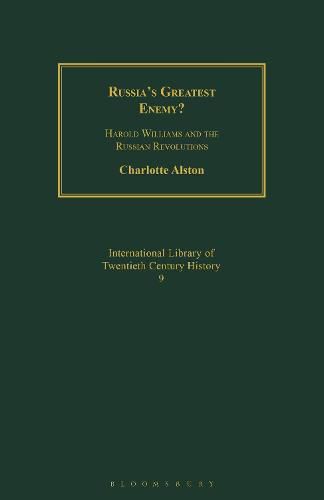Readings Newsletter
Become a Readings Member to make your shopping experience even easier.
Sign in or sign up for free!
You’re not far away from qualifying for FREE standard shipping within Australia
You’ve qualified for FREE standard shipping within Australia
The cart is loading…






A remarkably talented linguist, foreign correspondant in Russia from 1904-1921 and Foreign Editor for ‘The Times’, ‘Russia’s Greatest Enemy?’ traces the fascinating life and career of Harold Williams. This quiet and modest New Zealander played a central role in informing and influencing British opinion on Russia from the twilight of the Tsars, through War and Revolution, to the rise of the Soviet Union. The career of this keen Russophile and fierce opponent of Bolshevism illuminates the pre-World War One movement towards rapprochement with the Tsar, as well as the drive for intervention and isolation in the Soviet period. In this fascinating study Charlotte Alston explores the role of Williams as the interpreter of Russia to the British and the British to Russia in this turbulent period in the history of both countries
Introduction 1. New Zealand, 1876-1900 2. Journalism, 1900-1914 3. Britain, Russia, War and Revolution, 1907-1917 4. From Revolution to Intervention, 1917-1921 5. The Times, 1921-1928 Conclusion Bibliography
$9.00 standard shipping within Australia
FREE standard shipping within Australia for orders over $100.00
Express & International shipping calculated at checkout
A remarkably talented linguist, foreign correspondant in Russia from 1904-1921 and Foreign Editor for ‘The Times’, ‘Russia’s Greatest Enemy?’ traces the fascinating life and career of Harold Williams. This quiet and modest New Zealander played a central role in informing and influencing British opinion on Russia from the twilight of the Tsars, through War and Revolution, to the rise of the Soviet Union. The career of this keen Russophile and fierce opponent of Bolshevism illuminates the pre-World War One movement towards rapprochement with the Tsar, as well as the drive for intervention and isolation in the Soviet period. In this fascinating study Charlotte Alston explores the role of Williams as the interpreter of Russia to the British and the British to Russia in this turbulent period in the history of both countries
Introduction 1. New Zealand, 1876-1900 2. Journalism, 1900-1914 3. Britain, Russia, War and Revolution, 1907-1917 4. From Revolution to Intervention, 1917-1921 5. The Times, 1921-1928 Conclusion Bibliography